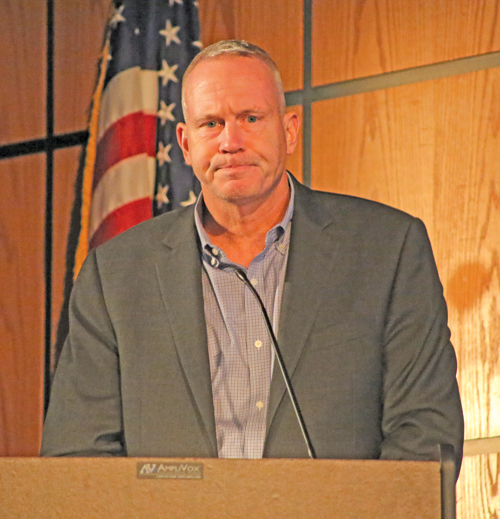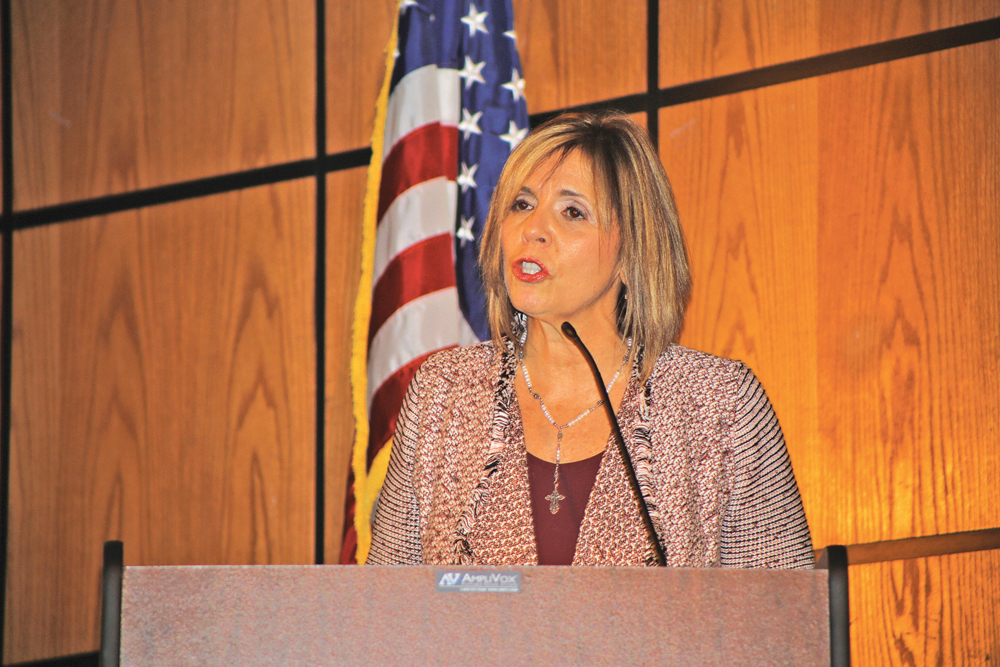Sadness and horror at Southampton Town opioid forum

A recorded voiceover filled the packed auditorium at Hampton Bays High School last Wednesday night.
“Hi, I’m Tom Ventura,” it began, and the speaker continued to detail his life as an adolescent from Kings Park. A lover of sports and the outdoors, Mr. Ventura was the “All-American boy.”
His family struggled in the early 2000s when three of his grandparents died within two years. His parents divorced around the same time.
Shortly after, the voice explained, he began consuming alcohol and using marijuana on weekends. This soon turned into smoking daily, but this high still wasn’t enough to numb the pain caused by the loss of his family members, so Tom turned to painkillers and later, as a senior in high school, to heroin.
The fall after high school graduation, he entered rehab, but got kicked out for misbehaving. He eventually entered numerous other rehabs and a 28-day program, at one point staying sober for eight months.
The recording ended with a 21-year-old Tom explaining that he went to hang out with his friends and get high one more time before entering a sober house the next morning. He never entered the sober home, as he was found dead that morning.
“I was on the express train to Manhattan when I got a call from my 18-year-old son about my other son being dead,” Tom’s mother, Linda Ventura, said at the first Southampton Town Opioid Addiction Task Force public forum.
“We know better, we have to do better at this point in time,” she told a crowd of nearly 250 gathered at Hampton Bays High School. “I’ve been where you are; I don’t want you to be where I am.”
The public forum, titled “It Hits Home,” was created by co-chairmen Southampton Supervisor Jay Schneiderman and retired News 12 Long Island Anchor Drew Scott, whose granddaughter Hallie Rae Ulrich died from an opioid overdose in September.
Four guest speakers, including Ms. Ventura, spoke about the challenges of opioid addiction and ways to combat it.
Dr. Jeffrey Reynolds, president and chief executive officer of Family and Children’s Association, addressed the importance of educating children about addiction at an earlier age. Rather than teaching students about the dangers of drugs in middle or high school, they should learn about how to cope with their feelings — often a reason people turn to drugs — starting as early as kindergarten.
Kym Laube, executive director of Human Understanding and Growth Services, a Westhampton nonprofit focused on addiction prevention education, agreed. A former addict who’s now been sober for 28 years, she said students already know drugs are bad, so the conversation needs to be taken “a little bit further.”

Additionally, Dr. Reynolds said treatment options need to change. Often, insurance companies will deny addicts access to rehab facilities, saying they’re not addicted enough to qualify or they need to fail at an outpatient program before they can enter an inpatient one.
“The problem is people get into treatment very, very late in the game,” he said. “The average length of stay is 8.5 days in inpatient … We won’t solve this problem until we have treatment on demand for everyone.”
Southampton Town Police Chief Steven Skrynecki shared statistics, saying fatal overdoses have more than tripled in the town. Five deaths were reported in 2016, compared to 17 in 2017.
“If we don’t do something fast, that number is going to keep growing,” he said, “so there’s an urgency to this meeting.”
The chief added that the town will launch a “no questions asked” substance testing program in January. Residents can anonymously bring in unknown substances to the police department to be identified if they believe a friend or relative is using drugs.
He said the 26-member town task force is focused on four things: awareness, education, enforcement and treatment.
Following the guest speakers, audience members were was invited to ask questions and comment on the information shared. Many commended the town for creating the task force, saying it’s been needed for a long time.
They noted that there was still more work to be done, however, pointing out that the task force includes no people of color or young people.
“We know people use to cope with trauma and mental health issues,” said Erick Saldivar, who’s studying at Suffolk County Community College to be a chemical dependency counselor. “We need not just legislators, we need to get young people involved. I don’t see any young people sitting behind these tables.”
Mr. Schneiderman said the task force hopes to hold another forum in the spring.
Top photo caption: Linda Ventura speaks last Wednesday at the first Southampton Town Opioid Addiction Task Force public forum. Ms. Ventura lost her son, Thomas, to opioid addiction when he was 21. (Credit: Nicole Smith)









